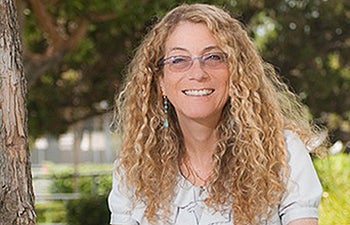Tricky Treating on Halloween
When Donna Spruijt-Metz was young, her mother would sit down with her after trick-or-treating on Halloween and help her sort her candy.
“We had a joke about how she loved the mini-Hershey bars, so she would negotiate with me for them,” recalled Spruijt-Metz, professor of psychology (research) and director of the Mobile Health (mHealth) Collaboratory at USC Dornsife’s Center for Social and Economic Research.
“She would bargain with me and always say that she wanted to keep those chocolates for herself,” Spruijt-Metz said. “Now that I’m older, I know that she didn’t eat them all, but it turned into a conversation in which she made me think about what I really liked and what I liked less — and then convinced me to give up the ones I didn’t truly enjoy.”
Spruijt-Metz believes her mother’s method of helping her evaluate the annual sugar haul set the stage for the thoughtful approach to eating she employs as an adult. She now encourages minority youth in Los Angeles to do the same through her programs to combat childhood obesity.
Children of the corn (and other vegetables)
Spruijt-Metz is the principal investigator on an initiative called Virtual Sprouts, a digital gardening game designed to change kids’ dietary knowledge and behavior. “I think it’s more effective to help children plan what they should be eating to stay healthy — rather than telling them what they shouldn’t have,” she said.
The program allows children in grades three through five to design virtual gardens, planting the computerized crops and watching them grow. It’s already active in a few clinics in Los Angeles.

Spruijt-Metz also has a new program in the works, researching how families interact around food and how that affects overall health.
“The program, through the National Science Foundation and the National Institutes of Health, is called M2Fed, which is short for Monitoring and Modeling Family-eating Dynamics,” she explained. “We are using in-home wireless sensors to study families’ interactions around food in real time.”
Regardless of how accurately people think they are reporting their eating behaviors to researchers and nutritionists, Spruijt-Metz believes it’s impossible to know for sure what they actually consume.
“And even if we did know exactly what people ate, how well are we doing as a society with messages like, ‘Eat less sugar?’” she continued. “Not well. But we do know that interactions around food significantly influence the way people eat — and that those behaviors and dynamics can be changed.”
Maintaining paranormal activity
Being a childhood obesity researcher, Spruijt-Metz fields questions every year about Halloween and how to handle the anomalous amounts of sugar entering households in one night. Ultimately, though, she says Halloween is something parents can use as a teachable experience — rather than a horror story.
“If parents have already put in the work teaching their kids about healthful eating, it will be easier to keep them from gorging on Halloween candy,” she said. “But it’s never too late to start the conversation.
“After Halloween, I always ended up with a reasonable amount of candy, and my mom and I would agree on how much I could eat per day,” Spruijt-Metz said. “But eventually I lost interest in it.”
And, philosophically, Spruijt-Metz thinks that as long as you eat your real sprouts and other healthful foods, treating yourself to sweets now and then is a part of a healthful lifestyle.
“I always keep a bowl of dark chocolate on my desk,” she said. “I love chocolate.”